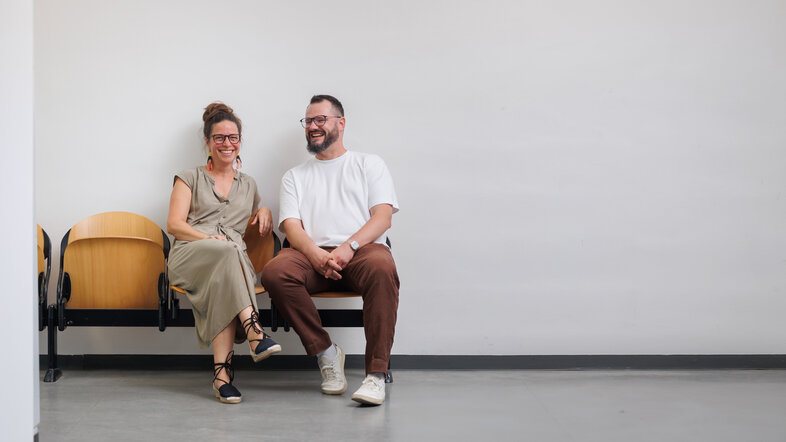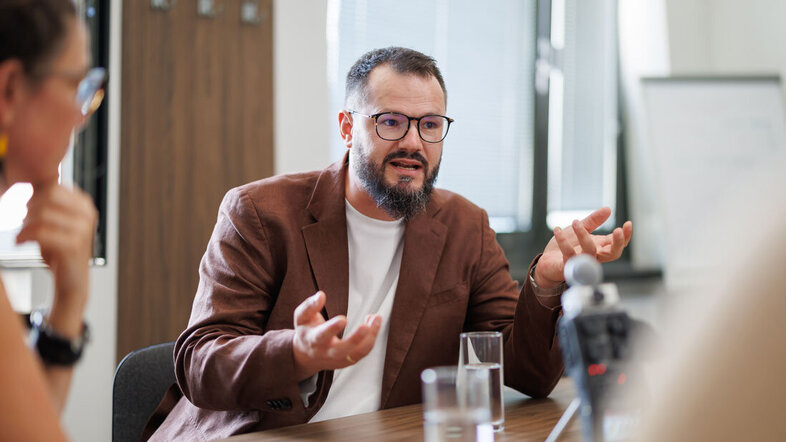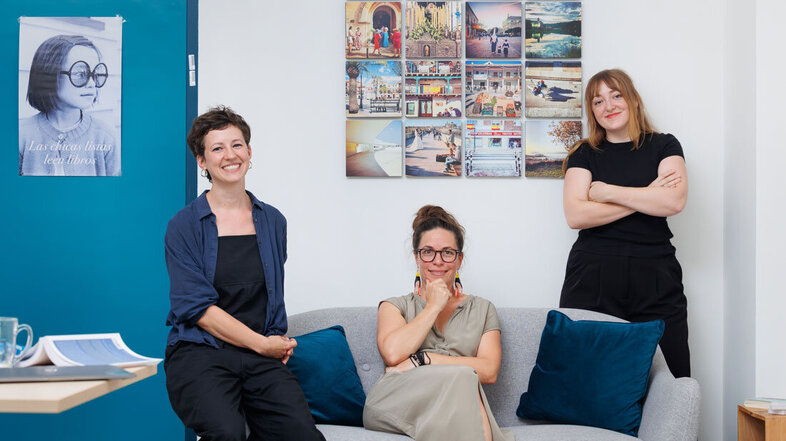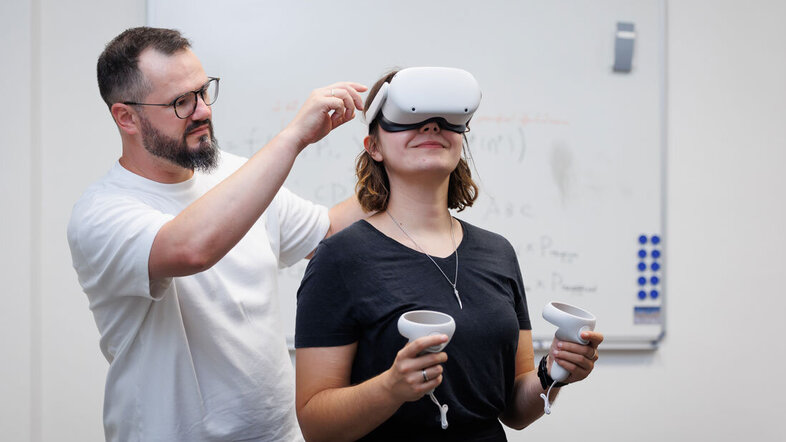Health requires solidarity
The nearest medical specialist centre is 20 km away and you can only reach it by car. The antibiotic for your baby is sold out due to delivery bottlenecks. The next available appointment with your gynaecologist is only in four months. Almost every one of us has probably already been treated unfairly in the health care system. Even though health is considered a human right, our opportunities to maintain our health or recover from illness vary greatly. Not only do we have little control over how genes and the environment affect us: income, social status and even place of residence, origin and gender influence our access to treatment options and how well they can take effect.
"No, health is not fair," says medical anthropologist Janina Kehr, "not as long as we live in a society that is not fair." A look at the global distribution of medical resources makes this especially evident. "The fact that people in some parts of the world die from diseases that have been eradicated here, because they lack access to vaccines and medication is simply unfair," adds social psychologist Robert Böhm.
Together, the two researchers have founded the new research network "Health in Society", bringing together the expertise of numerous academics from the University of Vienna to address diverse and pressing issues in the field of health and well-being. With their extensive expertise, they aim to break new ground in health research: Janina Kehr by taking a critical look at global power and distribution structures. And Robert Böhm with his knowledge of how the behaviour of individuals affects the health of all. Together, they are the ideal conversation partners to provide a comprehensive overview of the question "Can health be fair for all?".
Do we have a right to health?
In Austria, there is no explicitly enshrined fundamental right to health, but access to health care services is regulated by a comprehensive social health insurance system. Almost all citizens have compulsory insurance and thus access to medical care. The Austrian Act on General Social Security (ASVG) and the Austrian Act on Hospitals and Health Care Institutions (KAKuG) form the legal basis. In addition, the UN International Covenant on Economic, Social and Cultural Rights ratified by Austria obliges the state to take measures to promote the health of its people. The European Convention on Human Rights (ECHR) also indirectly establishes the right to health by guaranteeing the right to life and protection against inhumane treatment.
The best possible health
The WHO defines health as comprehensive physical, mental and social well-being that goes beyond the absence of disease. Austria has also ratified the International Covenant on Economic, Social and Cultural Rights (UN social covenant), Article 12 of which recognises the right to "the highest possible level of physical and mental health". All these aspects must therefore be covered and depend on how fair the framework conditions are, emphasises Janina Kehr, "Who can afford healthy food? What products are offered in the supermarket or pharmacy and who has an impact on this? In this context, we must also ask questions about the distribution of capital and influence."
This is precisely what the social and cultural anthropologist, who has studied the effects of austerity on the health care system during a research stay in Spain, sees as the core of her work. Raising awareness of the problems of less privileged people is the first step away from systemically unfair structures and toward more equal opportunities. "Justice in this context means that every person can achieve and live the best possible standard of health," the two researchers agree.
Health, a collective good
The good news is: We can all contribute to achieving this aim. "Health is a challenge for society as a whole," says Robert Böhm, who, as a member of the Technical Advisory Group on Behavioural and Cultural Insights, advises the WHO on improving health counselling and care in Europe. We might recall the COVID-19 pandemic: "Such a crisis can only be dealt with successfully if everyone contributes, i.e. if they behave in the interests of other people.” In specialist language, such behaviour is called ‘prosocial behaviour’. In this sense, health is a collective good for which we are jointly responsible: For example, during a pandemic, the spread of a virus could be contained if as many people as possible support the measures for containing it.
Conversely, certain types of behaviour harm the health of everybody else. If doctors routinely prescribe antibiotics or patients demand them out of habit, it increases the risk of spreading resistant germs: The more antibiotics we prescribe and use, the more resistances we will create. "It is precisely this communal aspect of maintaining collective health that raises the question of fairness," emphasises Böhm. And for Janina Kehr, it is the source of her motivation "to think of health care as something characterised by solidarity, if you want to make it fair".
Medication: Can less be more?
Research contributes to the identification of the various determinants of fair health and to the development of solutions. In their current research project "Less is more", Janina Kehr and Lisa Lehner from the research group "Health Matters", together with Igor Grabovac and Honja Hama from the Medical University of Vienna, are investigating how to make the prescription of antibiotics and benzodiazepines (sleeping pills and sedatives) safer. "Antibiotics and 'benzos' are prescribed frequently and represent a kind of infrastructure of modern health care," says Kehr. This has massive consequences, such as loss of efficacy due to drug resistance or drug dependence in the case of benzodiazepines.
The interdisciplinary project is investigating how antibiotics and benzodiazepines are prescribed in Vienna, by whom, when and why. "We examine the reasons and indications for prescribing these drugs or for not prescribing them, and explore to what extent patients have a say in this decision." Much of the field research is already completed. "We are now sitting on a huge pile of data, hundreds of pages of notes and interview transcripts, and we are starting to analyse them," says Kehr. The declared aim of the project, which is funded by the Vienna Science and Technology Fund (WWTF), is to provide recommendations to the various stakeholders in Vienna in a ‘policy brief’. Ultimately, it is about creating awareness of the problem, of making the prescription and use of these drugs more sustainable and safer, but also of encouraging ‘de-prescribing’. This means: prescribing less, if the damage potentially outweighs the benefits.
Making better decisions through nudging
In everyday life, we are often not even aware of the influence our individual behaviour can have on the health of others. "The tendency to show prosocial behaviour is also a bit of a matter of character, so it is part of our personality," says Böhm, but adds that it would be wrong to simply delegate the responsibility on to the individual without providing a decisive resource: information.
Raising awareness can cause behavioural changes. For this, it is important to provide information in a way that addresses people's ‘prosocial motives’. A typical example: "When I get vaccinated, I do not only protect myself, but also contribute to herd immunity. Our research shows: Even if I do not experience the disease as a great threat, protecting more vulnerable people around me can motivate me to get vaccinated." For example, babies cannot be vaccinated against some diseases such as the measles, a threatening infection for this age group, and depend on herd immunity. "So, the least we have to do is educate, to ensure that people can take the best possible decision for themselves and others in the first place. For this, information must be provided in such a way that it reaches people with very different educational backgrounds," Robert Böhm sums up.
He is convinced that digital technologies can be useful strategies in this context. The psychologist considers virtual reality especially promising for vivid hands-on experiences. Only recently, in a cooperation with the University of Copenhagen, Böhm tested a VR adventure game on the subject of multi-resistant germs: Based on their decisions in the game, users can learn ‘in real time’ about the dangers of the incorrect use of antibiotics and how to prevent them with prudent use. In the study, such ‘experience-based communication’ was more efficient than conventional measures and could be particularly useful if the threat scenario is not tangible in everyday life, explains Böhm.
However, as a psychologist, he also knows about the strong effect of unconscious decisions on our behaviour. "Imagine standing in the cafeteria and looking at the menu. Research has shown that people are more likely to choose the option listed at the top. We often take decisions in such a simple way." If the healthier option is listed at the top, it is also selected more often. These small interventions are called nudges. "This is how behavioural changes come about without depriving people of the freedom to order the French fries anyway," explains Böhm.
Nudging in everyday life
The concept of nudging comes from economic psychology and we regularly experience it in our everyday lives. For example, expensive premium products in the supermarket are often placed at eye level, making it easier for customers to grab them instead of cheaper items. But nudging can also be used to encourage the purchase of healthier or more environmentally friendly products. Even if it serves a ‘good cause’: The use of nudging by public institutions must be communicated transparently, says psychologist Robert Böhm. In any case, research shows that nudging even works if it is made public.
How (un)healthy do you want to live?
Speaking of freedom: In view of the possibilities for regulations, decrees and incentives for a healthier society, the anthropologist and psychologist raise an important question: How much autonomy is left to the individual to decide how healthy or unhealthy they want to live? A conundrum arises: freedom of choice and collective health come into conflict. Many of are very sensitive to limitations in their freedom of choice, as Böhm himself showed in his research. "Even among people who are in principle pro-vaccinations, many react very sensitively to the coercion that comes with a compulsory vaccination," says Böhm, describing the social effects of compulsory vaccinations examined in his research. They can even trigger a drop in vaccination rates for other diseases as well.
Research at eye level
Health concerns us all. You cannot study health without talking to people. "That is why it is important for us to connect with the public and invite them to share their experiences and problems in order to become part of our research," emphasises Böhm. For example, interactive pop-up or travelling exhibitions as well as traditional workshops for exchange are potential citizen engagement activities. Using participatory health research, they aim to explore: What are good options – and for whom? Kehr adds, "I see my contribution in raising awareness of the problem of inequalities through bottom-up research, at the everyday level, and making them visible so that change can happen."
On this path to change, interdisciplinary research initiatives, citizen participation and education are our most powerful tools. Can we, then, create a future in which equal access to health resources is a reality? A future in which everyone can take informed health decisions? That is the goal that researchers such as Janina Kehr and Robert Böhm are targeting together: achieving health equity for all.
In our research, we are interested in the interplay between individual decisions and social rules ‒ with the aim of creating conditions under which people can make informed decisions.Robert Böhm
Böhm is member and deputy chair of the Technical Advisory Group on Behavioral and Cultural Insights of the World Health Organization/Regional Office for Europe and advises the United Nations (among others, he contributed to the current UNDP Human Development Report).
Not only do we need a right to health, but also the conditions that allow all people to be healthy and thrive – a utopia, perhaps, but one that is worth standing up for.Janina Meillan-Kehr
The research fields of the anthropologist include hospitals and medical practices. She sometimes even dons a white doctor's coat and accompanies doctors on rounds. "The ethnographic methods also allow us to look behind the scenes and participate in daily life at the hospital," says Kehr.
- Social and Economic Psychology Group
- Website of Robert Böhm
- Website of Janina Kehr at the Department of Social and Cultural Anthropology
- Research Group "Health matters"
- Project "Less is more"
- Health-related education programmes at the Postgraduate Center of the University of Vienna






